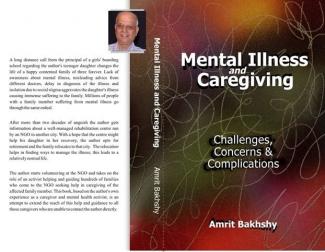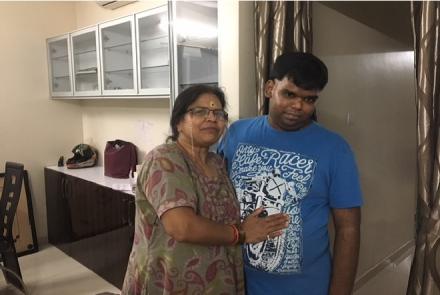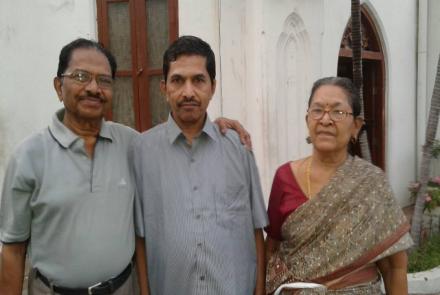
‘Mental Illness and Caregiving: Challenges, Concerns and Complications’ – authored by Schizophrenia Awareness Association’s president Mr Amrit Bakhshy, was launched to coincide with World Mental Health Day. This comprehensive book, the first of its kind in India, is written mainly for caregivers of persons with mental illness and provides valuable information. Here is an interview with the author and an extract from the book.
What was the inspiration for your book? How was the idea born?
I passed through very difficult times as a caregiver due to my ignorance about mental illness and it took me several years to learn the ropes of caregiving and become a good caregiver to my daughter. In my present role as a mental health activist, I find that almost all caregivers are sailing in the same boat. They suffer due to ignorance and irreparable damage is caused to their ward due to delay in proper treatment. Many come to me for help and guidance at Schizophrenia Awareness Association, at home and, also, the phone keeps ringing with anxious callers. But, there are millions who can’t reach me. This book is an attempt to reach them and to mitigate their sufferings. For some time now, it was in my mind that I don’t have many years left and what I have learnt in over 25 years of caregiving and about a decade as an activist should not go waste. It must be made available to other caregivers when I am not on the scene. There were such requests from other caregivers also. It’s gratifying for me that I would be leaving something useful for the present and the future caregivers. There is no such book available in the Indian market.
Could you tell us a little about the book and specific issues of mental illness the book deals with?
The book covers a wide canvas and almost all the information that a family with a member with mental illness needs is available in the Book. The first part is titled “Orientation” and contains basic information about mental illness and how families should handle the situation when it dawns upon them that a family member has developed symptoms of mental illness. The second part is titled, “Theories, Therapies and Treatments” and contains answers to all the queries which families have but don’t know where to get the answers and the guidance. The third part is titled. “Empowerment” and gives advance information about various legal provisions concerning mental health, various benefits available, rights of patients and their families and all that they should know in addition to the day to day management. The fourth part is “Annexures” and is a useful reference guide. It contains lists of all mental hospitals in the country, NGOs working for persons with mental illness and their families, general hospitals with psychiatry wards and half-way homes. I have given the contact details and the lists are arranged state-wise and city-wise. So the stakeholders can know easily where the facilities are available close to their homes. There is a list of books for reading by caregivers. The basic terms have been explained in a separate annexure and there is a list of abbreviations with full form. There is also an annexure on who’s who in mental health in India. I have taken lots of pains in compiling this information and I know it is not available anywhere else at one place.
Who is the target audience of the book? Is it essentially for caregivers as the title suggests?
It is written for family caregivers. But it will be of interest to other stakeholders, mental health professionals, students of psychiatry and clinical psychology and all those having some interest in mental health. We have already received more than 200 pre-publication orders. Marathi edition will be out in the next 6 months and Hindi edition by the end of 2017.
Do you think there is greater acceptance of mental health issues in India today with celebrities coming out in the open with it?
There is better awareness and stigma is slowly being eroded. But it needs to be hastened. It can get momentum, if the State steps in and takes it as a national campaign as it is being done in regard to cleanliness and use of toilets.
Could you describe a book on mental illness that influenced you greatly?
“Triumphs and Tragedies” the memoirs of Canada based Dr. Jagannath Wani, who is a caregiver for his wife, has inspired me greatly. The kind of challenges that he faced all his life as a caregiver for his wife and also one of his daughters, in an alien land with no family support is amazing and makes him a super caregiver.
Extracts from the Book “Mental Illness and Caregiving: Challenges, Concerns and Complications” (Chapter “Theories, Therapies and Treatments”)
Searching for a Psychiatrist
If the family of a person with mental illness is in a small town, the choice of a psychiatrist is limited. But if the family is in a large town, they will have wider choice. When deciding on a psychiatrist, the normal tendency is to ask a friend or a colleague who has been taking his/her family member with mental illness to a psychiatrist and be guided by his/her recommendation. Other than this, the family may also request its family doctor to recommend a psychiatrist. The family may also choose to go to a psychiatrist who is in the neighbourhood to save on time and conveyance expenses.
It is, however, not necessarily true that if a psychiatrist’s treatment has helped the family member of a caregiver’s friend, neighbor or colleague, it will also help his/her family member with mental illness. Here what is good for the goose may not be good for the gander. When a family caregiver is looking for a psychiatrist, he/she needs to look for one who is well qualified and has adequate experience in treating patients with mental illness. Another important factor is how much time the psychiatrist gives to each patient. There are psychiatrists who are so busy that they have no more than 4/5 minutes for each patient. Some of them give too many appointments during their consultation hours and it results in a wait much beyond the scheduled time of appointment. Many patients get restless and force their caregivers to leave without meeting the psychiatrist. Such psychiatrists, even if they have a good reputation may not be the right choice. Choose a psychiatrist who is not only well qualified and experienced but who also gives adequate time to each patient and who calls the patient in as per the appointment time
Changing the Psychiatrist
A family caregiver may not be happy with his/her family member’s psychiatrist but may not know how to go about switching over to another psychiatrist. The family caregiver might feel awkward to tell the psychiatrist that he/she wants to discontinue with him/her. Most of the family caregivers just stop going to the psychiatrist, they want to discontinue with and start with a new one.
The family caregiver’s relationship with a psychiatrist is that of a health care consumer and a health care service provider. The caregiver of the consumer should feel satisfied with the services he/she pay for. If not, the caregiver has a right to change the psychiatrist for the family member with mental illness and there is nothing wrong in this. The family caregiver might feel delicate as he/she might have developed some personal relationship with the psychiatrist. But a family caregiver should be clear in his/her mind that he/she visits a psychiatrist for the paid services the family member needs. It is not a social call. It is a client’s right to get value for the services paid. As for discontinuing with the psychiatrist who has been attending to the family member with mental illness, courtesy demands that the family doesn’t do it abruptly. Not to turn up for an appointment is discourteous. Instead, to cancel an appointment over phone, is a better via-media, if the family caregiver finds it hard to say it in person. If the family caregiver feels awkward, even in saying it on phone, he/she may choose to write a mail or send a text message saying that the family has decided to consult another psychiatrist. Whatever mode the family caregiver chooses, he/she should not forget to thank the psychiatrist for the time and the help he/she gave in the past. The psychiatrists understand such decisions of their clients, as such exits are not uncommon and are a part and parcel of the profession.
Marriage and Mental Illness
Marriage is a delicate and sensitive issue. A family caregiver is always in a dilemma whether to plan a marriage for the family member with mental illness. Often a family is persuaded by friends and relatives to get him/her married. The following reasons weigh with a family caregiver to arrange matrimonial alliance for the family member with mental illness:
- Belief that marriage will provide stability in life
- Hope that marriage might help in his/her recovery.
- Marriage is considered to be a solution to the problem of family caregivers, ‘What after us?’ The spouse will be able to provide care for a much longer period than the parent caregivers.
- The family agrees for his/her marriage under social pressure from friends and relatives
- Marriage will transfer the caregiving responsibility to the spouse.
- Marriage can provide emotional and physical support.
- Marriage will ease the financial burden if the spouse is earning.
- Marriage will facilitate successor to the family estate
- Marriage is a social sanction for basic biological needs
Schizophrenia does not affect sexuality as such though negative symptoms might cause sexual dysfunction. During active psychosis, excessive sexual desire and indulgence can happen which can affect the spouse of the person with mental illness. Anti-psychotic medication can cause sexual malfunction in some cases. Newer generation anti-psychotics, however, are generally free from any such side effects.
Marriage is a contract between the groom and the bride. If one of them is mentally ill to the extent of not understanding the duties and responsibilities of marriage, then the marriage contract can become void. The marriage can also be declared void on the ground of concealment of mental illness at the time of marriage. If the mental illness strikes after marriage, divorce can be sought on the grounds of incompatibility and non-consummation of conjugal rights.
Experience shows that out of 10 such marriages 9 turn out to be a failure. Girls with mental illness are sent back to their parents within a few days to a few months after their marriage. Likewise brides of boys with mental illness return to their parents and criminal court cases are filed in courts against the boy’s family. There is a small percentage of spouses who accept their destiny and willingly or grudgingly assume the role of a caregiver.
There is no common yard stick to decide whether the person with mental illness should be married or not since each case is different. The important thing to remember is that the marriage should never be thought of as a part of treatment to facilitate recovery. In fact the stress of social and financial responsibilities subsequent to marriage might increase symptoms and might even cause a relapse. However, this does not mean that marriage need not be considered even for a well recovered family member. The decision needs to be taken jointly by the family in consultation with the mental health professionals who are familiar with the case history. A recovered family member can function normally after marriage but fear of sexual competence, compatibility issue, additional responsibility and family expectations remain.
In any case mental illness should not be concealed from the other party under any circumstances even if it means the end of the proposal. It is better to be frank and honest and tell the truth rather than spending lots of money in a failed marriage which causes trauma for both the families and can aggravate illness of the family member and make the other partner ask for a divorcee. Many families inform the other party about their family member’s mental illness, but give a much diluted version, saying that treatment was taken for stress or there was depression for some time. This, however, does not help in any way as the truth comes out sooner or later. Families, therefore, need to be cautious about legal problems which might arise due to misinformation about the mental illness of their family member.
In this connection, it may also be remembered that mental illness is considered a genetically linked illness and the children of parents with mental illness have a little higher risk of mental illness than the children of parents with no such history. There is, however, no way to predict the appearance of the symptoms. Another related aspect is that if a married female family member becomes pregnant, continuation or discontinuation of medication can be risky either way.
(As SAA President Mr Bakhshy was actively involved in consultations in drafting of the Mental Health Care Bill 2013 and was invited for national consultations and for a presentation before the Parliamentary Committee. He serves on committees of many national bodies dealing with mental health. In 2015, Mr Bakhshy was appointed by the Govt. of India as the Chairperson of the Hospital Management Committee of NIMHANS)
















